GECDSB Flexing Body and Mind
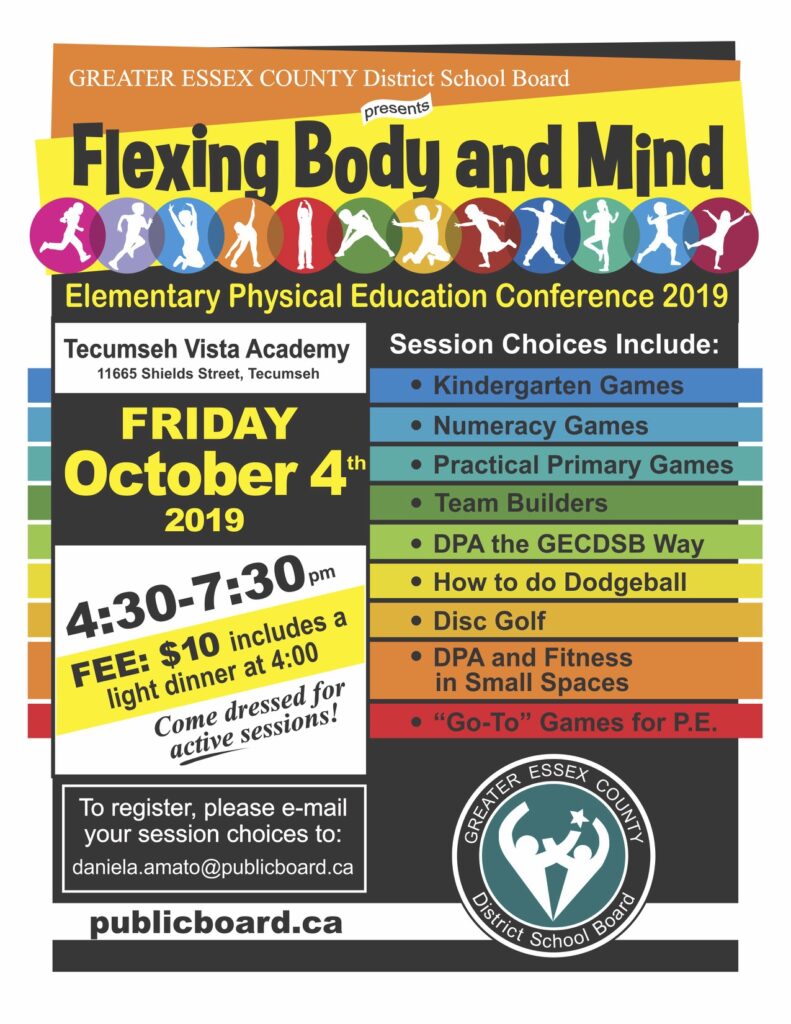
At the GECDSB, Elementary Physical Education Conference, I had the opportunity to sign up for various professional development sessions which I felt were most appropriate for my development. The physically active numeracy session was the most valuable in informing my teaching practice. I learned various ways to integrate numeracy with physical activity. As well, I learned the importance of embodied learning in mathematics, as it makes learning more meaningful, relevant, and students are more likely to remember what is learned. Following this session, I began to reflect on the importance of physically active numeracy. As many students experience mathematics related anxiety, I realized that these activities might help mitigate some anxieties. When students are having fun, not in a traditional mathematics setting, and are physically active, anxiety is likely to be reduced. I look forward to applying the learning activities from this session into my classroom.
SCCDSB: EDSBY in Kindergarten & Documenting Student Learning
*Insert an artifact – handout from the session.* When volunteering in a Kindergarten classroom, I had the opportunity to join the classroom teacher in attending SCCDSB’s Edsby in Kindergarten, Documenting Student Learning conference. This conference was highly relevant to me as my service learning specialization is in early years education. I learned the importance of utilizing technology to most effectively document student learning in the kindergarten setting. As well, I learned how to use this documentation to carefully create meaningful report card comments. I am fortunate to have attended this conference where I had opportunities to learn from many experienced educators. It was valuable to participate in discussions with these educators, which looked at sample report card comments, and how they felt the language used could be improved.
University of Windsor: Vulnerability & Marginalized Populations Conference
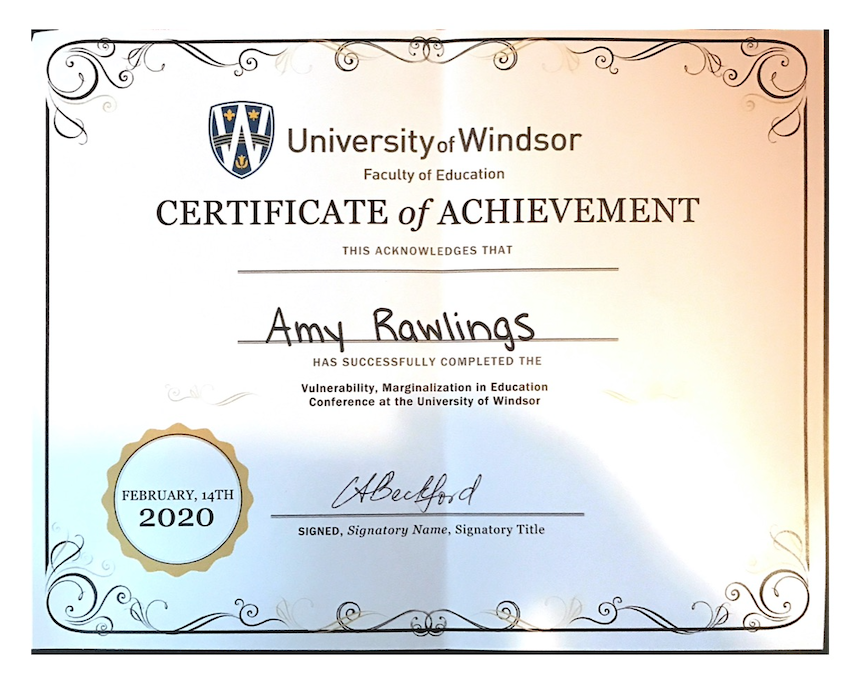
At the University of Windsor, I attended the 2020 Vulnerability and Marginalization Conference hosted annually by the Faculty of Education. At this conference, I attended various sessions and talks, however, one which stood out to me was presented by Windsor’s United Way. This talk discussed child poverty in the Windsor community, opening eyes, and providing me insight into the experiences and hardships faced by the students I teach. This session in particular, taught me the importance of getting to know my students, and establishing connections. Through the development of deep connections, will be more prepared to personally support my students on their life journeys, and with the challenges they may face on a regular basis. I have also learned the importance of checking in daily with my students and creating a safe environment where students are comfortable discussing challenges or barriers they face. This session has taught me the importance of using supportive language, and establishing a classroom environment where students feel their identity is valued. I will strive as an educator to ensure my future classroom is a safe and inclusive space for all students, who feel their identity is fully welcome regardless of background or life experiences.
Ontario Ministry of Education: Supporting English Language Learners in Ontario Classrooms
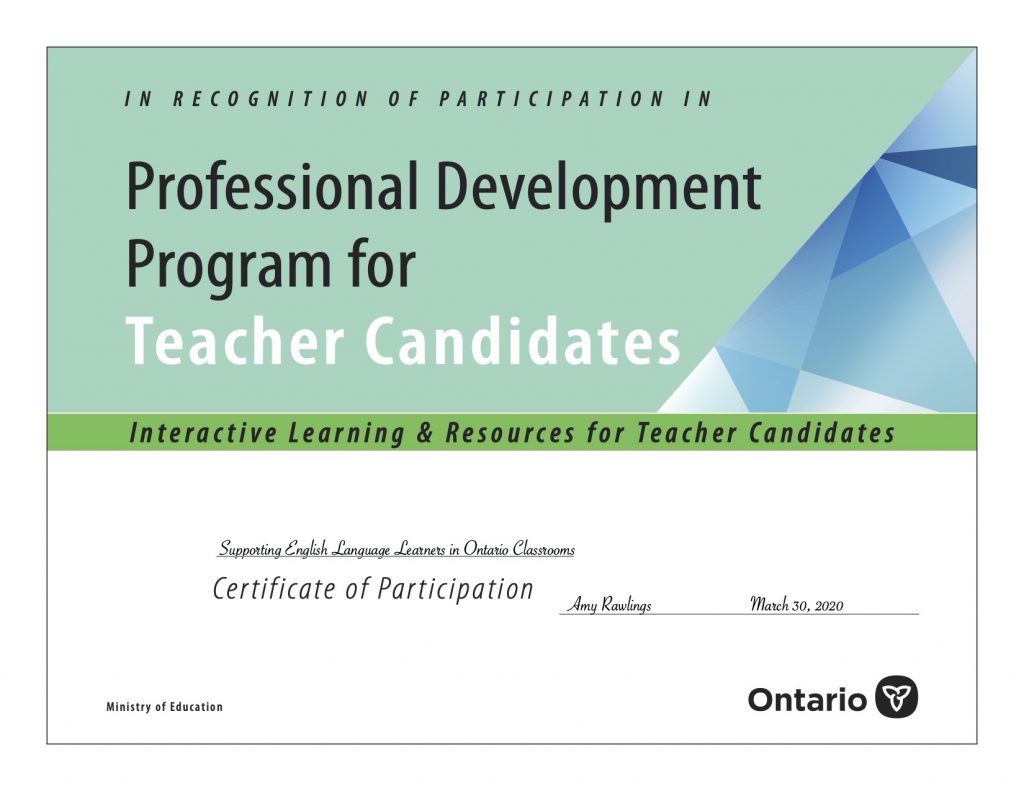
The Ontario Ministry of Education has provided me the opportunity to engage in various interactive learning professional development sessions as a teacher candidate. The certificate I have provided here represents the interactive session I participated in to learn about supporting english language learners (ELLs) in Ontario Classrooms. This session provided me the opportunity to engage with experts in the field, and to obtain valuable resources to enhance my future practice working with ELLs. This session informed me of Ontario Ministry policies and initiatives to welcome ELLs in Ontario schools. I have learned through this session to distinguish students from the programs that support their language acquisition (English as a Second Language Programs & English Literacy Development Programs). Furthermore, this session has enabled me to understand the distinction between modifications and accommodations, as well as the importance of providing either or both to ELL students as necessary. I have learned that these measures will ensure fairness for many of my future students. Moreover, I have learned to determine starting points for learning by getting to know the learner, building on their strengths, and by adapting programs based on ongoing assessments. This session has taught me about the Steps to English Proficiency, and to use them as a resource which supports policy, supports language acquisition and literacy development, and aligns with curriculum. This workshop has taught me to utilize initial assessment of ELL students to develop student profiles, support programming, begin conversations with parents and students, and to establish a common language for educators to use supporting ELL student’s progress. As well, I have learned the importance of utilizing ongoing assessment to implement differentiated instruction, track language proficiency and literacy development, to select appropriate resources, and to reflect on my own practice.
This workshop has also provided me with various strategies to support ELLs including the use of word walls with visuals, using appropriate sentence starters, and providing adaptive texts and graphics. Involving the wider school and community to support ELLs is also something I learned the importance of through this workshop, as it supports students to be more successful in schools. I have learned the significance of encouraging families to support children at home by maintaining their first language, and to learn as much as possible about students’ families, cultures, language, and identity, to foster meaningful connections. Lastly, this professional development session has familiarized me with various ministry documents including “Supporting ELLs with limited prior schooling,” and “Supporting ELLs in Kindergarten,” a document very important to me as I specialize in Early Years Education at the University of Windsor.
Google Certified Educator: Level 1
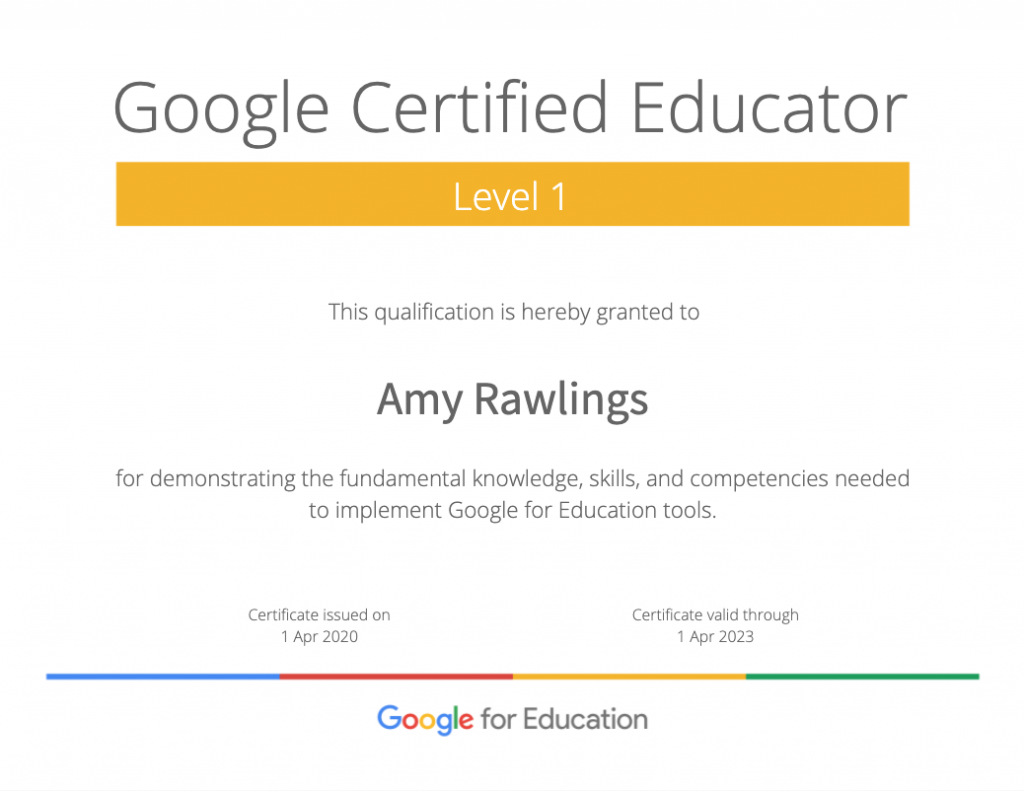
I am excited to have become a Level 1, Google Certified Educator in April 2020. As a result, I am now able to effectively and proficiently utilize Google tools in the classroom. Through the google certification training course, I have learned of the various google tools available, how to participate online with other educators, to create networks, to learn and grow as an educator, to join educator groups, and how to find local experts for support in the classroom. I have learned it is important to effectively apply google tools to enhance, rather than supplement learning.
This Google coursework has taught me to efficiently communicate information to all members of my future classroom community. In knowing what tools are available and how to use them effectively, I am now able to share more information in less time, and to bring both meetings and student work online. I have learned to safely store, access, and share documents via the web, reducing the need to print, and increasing accessibility for learners. As a result of of my google training, I am able to communicate professionally using gmail, google hangouts, groups, to open and improve lines of communication between myself, students, and teachers both within and outside of the school.
My google training has provided me with a toolset which will allow me to measure, analyze, and share student growth with students, administrators, and parents. This training has also taught me effectively build interactive lessons, and to facilitate meaningful group work using google tools. Lastly, one of the most important things I have learned from this training is how to promote in my students digital literacy, digital citizenship, and to facilitate positive online behaviour.
Ontario Ministry of Education: The Power of Assessment
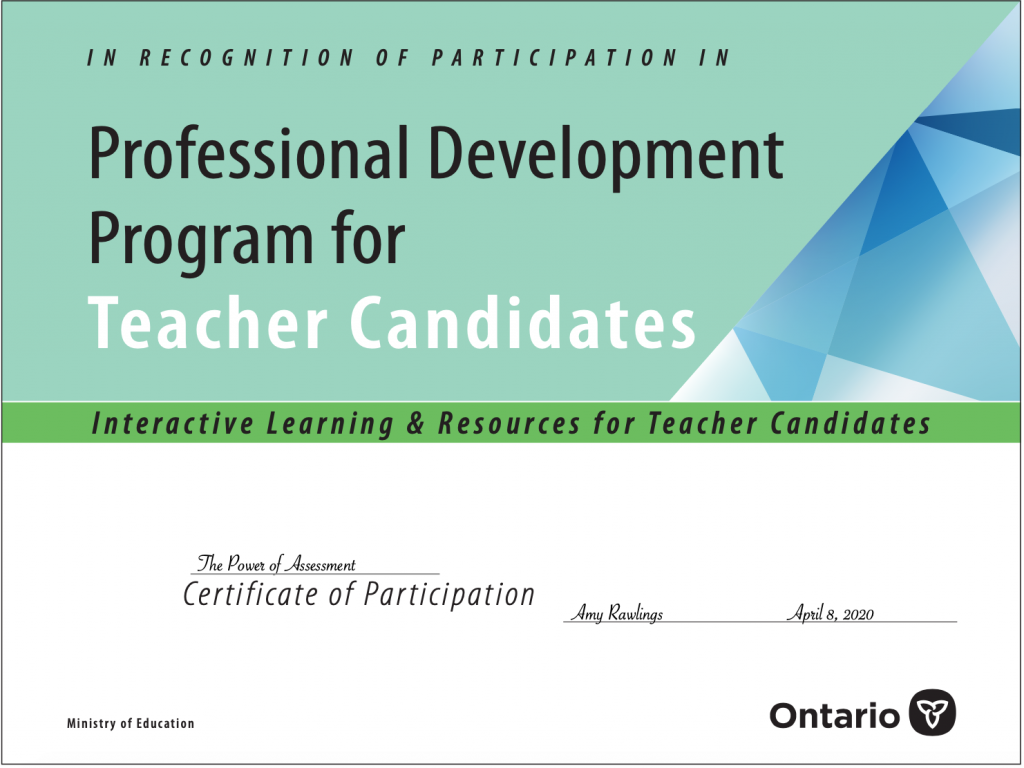
The Ontario Ministry of Education has provided me the opportunity to engage in various interactive learning professional development sessions as a teacher candidate. The certificate I have provided here represents the interactive session I participated in to learn about the Power of Assessment. This session provided me the opportunity to engage with experts in the field, and to obtain valuable resources to enhance my future assessment practices. This session has enabled me to think more deeply about all learners as competent, capable of complex thinking, curious, and rich in potential and experience. As well, this session has taught me to place emphasis on focusing on what learners can do, and not only gaps. This session has enabled me to consider principles which support and improve meaningful learning for students. I have learned to ensure my assessment is fair, transparent, and equitable for all students, and supports all students needs. As well, I have learned the importance of assuring assessment relates to not only learning goals in the curriculum, but also student interests and experiences which make all learners unique.
This session emphasized the importance of co-developing success criteria with students, ensuring students are clear on expectations, are accountable to these expectations, and have increased autonomy over their learning experiences. I have learned that it is important to offer students both choice and voice, in how students want to share their learning. I now understand that many students may prefer to demonstrate learning differently, and in a way which works best for them, while achieving the same criteria. I have learned that incorporating student self assessment is another excellent way to incorporate choice and voice in the classroom.
I have learned to assess effectively utilize curriculum achievement charts to ensure transparent and fair assessment, develop criteria, and to develop clear and specific feedback for both students and parents. This session has also taught me the importance of ensuring an in-depth analysis vs. a superficial analysis when providing students with feedback. I highly value this experience to further my knowledge in assessment, and look forward to applying it in my future classroom as a powerful tool to inform both my teaching practices and to enhance student learning.
University of Windsor Graduate Education Research Conference
The University of Windsor has provided me the opportunity to engage in various interactive learning professional development sessions as a teacher candidate. One which was very valuable to me was the Graduate Education Research Conference. This was a wonderful opportunity to listen to academics and experts in the field share their research. As a new teacher, it is important to me to stay up to date with current research to best inform my practice. One interesting session I attended in addition to research presentations discussed careers in research and academia. As someone who aspires to obtain a masters degree and possibly pursue my education further, this was a valuable experience. With listening to a presentation on careers, and presentations where academics shared their research, it prompted me to think about areas of research I may be interested in. One area in particular I am interested in is how embodied learning can enhance learning outcomes in mathematics and reduce mathematics related anxiety. As someone who experienced significant mathematics related anxiety as a young student, I am eager to explore ways in which this type of anxiety can be overcome in students to enhance learning outcomes. I believe once I begin to practice, expand my knowledge, face challenges, and step into a specific role in education, I will discover new areas of passion, which may open avenues for research. Overall, this conference was beneficial in allowing me to explore opportunities for research and to discover new evidence to inform my practice